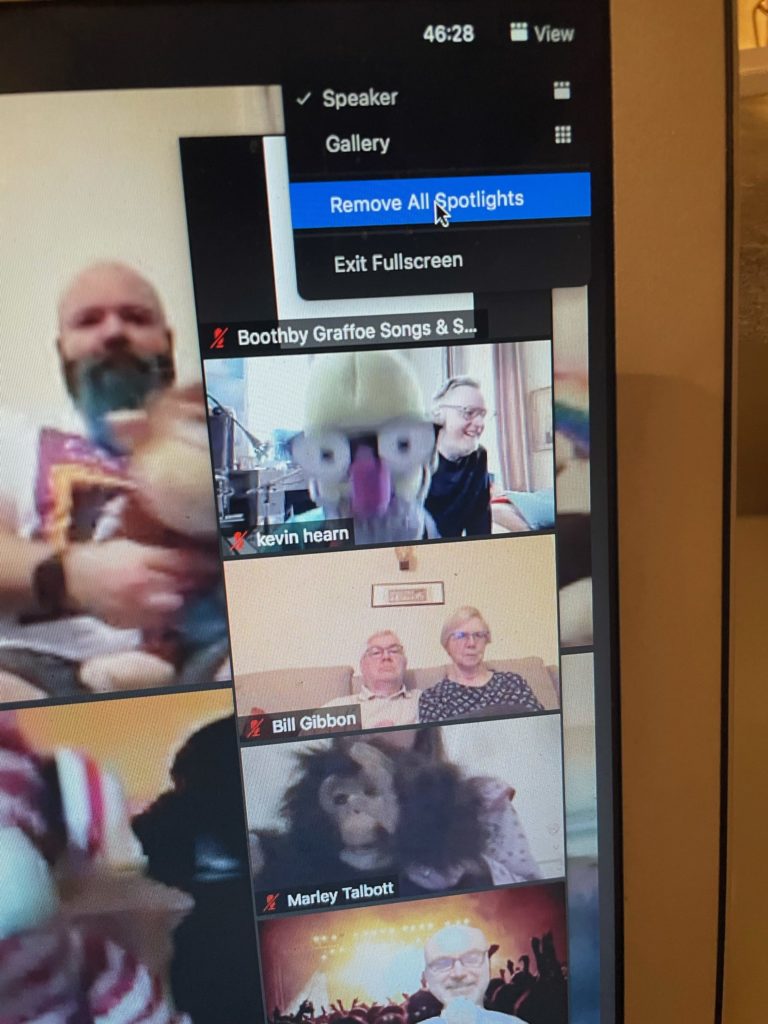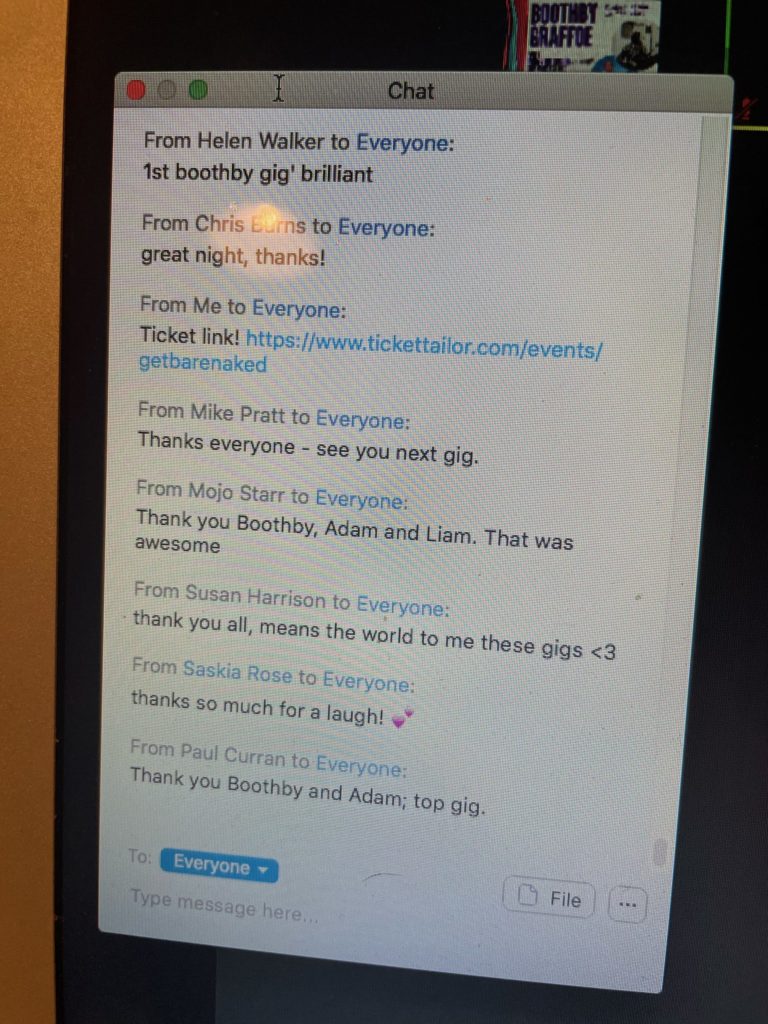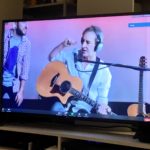Way back in July, I blogged about the different platforms enabling performers to carry on entertaining audiences remotely throughout the pandemic, using technology at a time where venues across the world sadly shut their doors.
Since then, I have, albeit almost accidentally, immersed myself in the world of online gigs, hosting and supporting a series of music and comedy events on Zoom. I’ve been involved in over 60 shows, each of which have had special, memorable moments for the act and audience alike.
At the start of 2020, my musical comedian friend Boothby Graffoe and I were shaping up for a handful of gigs across the UK, but after all live performances screeched to a miserable halt, he asked if I could explore online alternatives.
Similarly, Steven Page – who in ‘normal times’ I have the honour of playing alongside – very proactively set up ‘Live From Home’ concerts from his basement studio as early as April 2020; successful to the extent that as a series it has now passed 42 shows, barely skipping a beat on Saturday nights ever since.
Not only were acts the world over sacrificing their raison d’être – being in a room in front of an audience – but the reality is that, often as self-employed entities, the financial impact for artists worsened the longer the pandemic lasted too. Notwithstanding that some comedians and musicians have side-gigs writing and/or recording for other projects or acts, generally speaking the live show – together with merch sales and bar percentages – tends to account for the bulk of their income.

Here are some key insights I have learned in this space of time, which is now (amazingly) verging on a year. Rather than providing a walk-through of the technical features or platform nuances employed for these online events, most of which are by now well-documented, I will focus on the impact I’ve noticed on people – the online concert experiences and how communities have been shaped and wellbeing improved by these virtual events.
- Communities have been created around the live shows
Undoubtedly the most heartening aspect of running these shows has been seeing new relationships and communities emerge as a direct result. Many friendships are struck up between gig-goers at a venue where punters – strangers brought together by a common passion – recount shared experiences and interests over a drink. These online shows have allowed for a very similar connection. At Boothby and Steven’s shows, as with many others I’ve attended as an audience member, the chat box is non-stop and a place for fans to get to know one another. Steven’s fans now spend the Live From Home shows (and the week in-between, for that matter) chatting in a busy Discord server. Boothby watched on as two fans got engaged during one of his shows; the proposal took place in the Zoom chat. Both acts have recorded pandemic-themed songs, which fans have subsequently covered and championed on social media. I’m willing to bet that once gigs at venues return, there will be a whole wave of online friendships materialising in-person and audience members will recognise each other from the gallery view on Zoom.
- Collaboration is (still) key
The most significant difference for artists performing online is the lack of immediate feedback and interaction normally provided by an audience at a live show. Boothby quips that telling a joke and being met with complete silence is “very much like all my gigs”, but in all seriousness, it’s a strange dynamic to be reliant entirely on visual feedback (‘jazz hands’ is the method of choice at his shows!)
Some acts have provided a ‘front row’ option, where a limited number of attendees are unmuted and can be heard throughout the show (and in some cases, this permission is monetised). In the formative weeks of Live From Home, Steven gave all 900 audience members the unmuting feature and almost broke the internet (and his own eardrums!)
With this in mind, a really joyful feature of Boothby’s gigs has been the collaboration with other acts. We’ve invited other comedians to join the shows, and the back-and-forth facilitated by the split-screen speaker view very often feels like being a fly on the wall with two friends chatting down the pub. Shows with the likes of Stewart Lee, Tim Vine, Omid Djalili, Rachel Parris et al have given audiences a rare opportunity to see performers swapping stories – framing these events as somewhere between a live show and ‘an evening with’. This not only keeps the shows diverse for regular audience members, but it also entices new people to each show – as the guest bring along some of their own fanbase and crossover interest is formed.
- Online shows are often more efficient for the artist
Playing a show – or a series of shows as a tour – is an expensive business, and there are many costly elements to hosting a night’s entertainment: Venue and equipment hire, travel and fuel costs, hotel expenses, food and drink, insurances, licensing. Then there are the personnel costs involved in hospitality: drivers, tour manager, the crew (lighting, sound, security), promoter/s, venue staff, merch seller/s. In no way is this meant to be celebratory of their removal from the process, as the lack of shows, of course, sadly takes away income for those people. The point here is that, for the act themselves, online shows allow them to recoup much higher percentages and cuts of the gross takings. Many acts who are able to are, thankfully, in many cases using this to pay the aforementioned staff on retainer contracts, or those workers who are so integral to running live entertainment have been able to revert to an alternative online role (I, for instance, am way more comfortable sat on my cajon than I am tweaking Zoom audio and visual settings – but it’s a job I’m very happy to do in the meantime).
- Many artists will continue online shows post-pandemic
This is entirely subjective of course, but there’s a growing sense that online shows will continue to run even when we’re out of the pandemic. I personally don’t feel that the energy of a live show can be captured or replicated online: the adrenaline-fuelling dimming of lights as the act takes the stage, the buzz of a packed venue, the jostling at the bar – these are all things that now feel very much missed as part of the whole gig experience. However, there is definitely a convenience and accessibility that allows a space for online shows to run in conjunction with ‘in-person’ events. There are already ideas floating around using subscription services like Patreon where artists incentivise attendance at online events with discounted tickets to ‘real life’ gigs. For those who struggle either financially, socially or physically with events, online shows provide a safe and accessible alternative.

It has been eye-opening and quite a privilege to host online concerts in the last few months, and while there are sometimes tech hurdles and dodgy connections to navigate, the Zoom gigs have provoked a range of emotions – they’ve been moving, funny, silly and surreal. Most of all, they have been a way to retain a connection to people and performers, and for some – myself included – having a night’s entertainment in an otherwise relentlessly dull and emotionally challenging pandemic is actually a lifeline.
Have you attended online concerts in the last few months? I’d love to hear your thoughts and reviews in the comments below.

